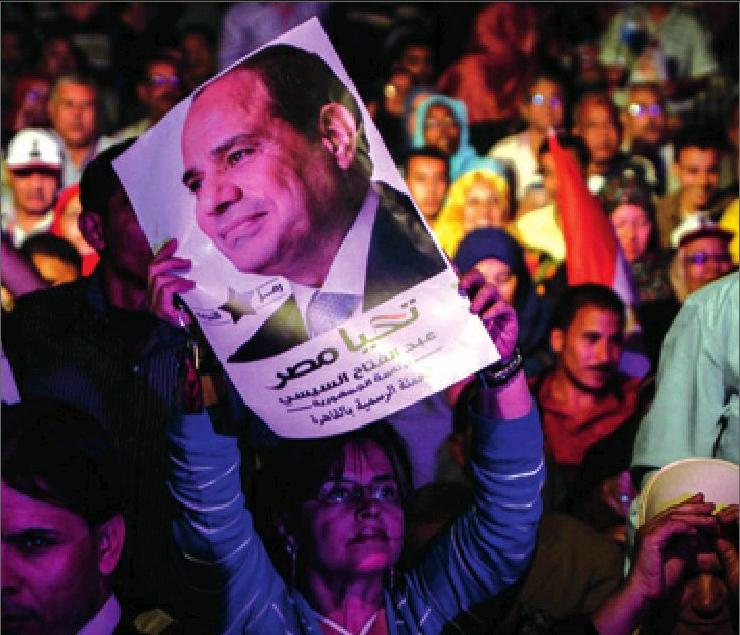Egypt’s Foregone Conclusion
2014-06-05ByLiuYueqin
By+Liu+Yueqin

Egypt is a giant of the Middle East, so the countrys presidential election has drawn global attention. The process, which began on March 31, followed through with nominations and registration by April 20. With the election scheduled for May 26 to 27, the final countdown is underway.
Egypts Supreme Committee of Armed Forces (SCAF) issued a recommendation on January 27 for the presidential run of former army chief and Defense Minister Abdel Fattah alSisi. Sisi headed the military and toppled elected president and Muslim Brotherhood-backed Mohamed Morsi in July 2013, leaving Egypt under the control of a military-supported interim government ever since. The interim government has supported Sisis presidential campaign, implementing a series of favorable policies and carrying out well-aligned preparations.
Egypt held a constitutional referendum on January 15, which was followed by interim President Adly Mansours announcement on January 26 that the presidential election would be held before parliamentary elections. The next day, Mansour issued a presidential decree to promote Sisi from general to field marshal—the highest military rank in Egypt. The move sought to raise Sisis power and influence enough to accumulate the political capital necessary to win the election. Political turmoil broke out again on February 24, once more, and the Egyptian cabinet was again reorganized. The Egyptian interim government presided by Prime Minister Hazem al-Beblawi declared a group resignation, and a new interim cabinet was sworn in on March 1. Egypt then issued the revised presidential election law on March 8, ensuring a smooth legislative road to the election.
The interim government and the military thus made thorough plans for Sisis election. Assuming Sisi is successfully elected as president, the ruling power of Egypt will be returned to the military.
The militarys strategy
Recalling Egypts history over the past five decades, a military strongman being elected as the countrys president has become a tradition. Famous Egyptian presidents like Gamal Abdel Nasser, Mohamed Anwar al-Sadat and Mohamed Hosni Mubarak all came from the military. Mohamed Morsi was the only nonmilitary president in modern Egypts history.
Sisis presidential campaign reflects the influence of the military more than his own political standing.
The countrys political battles have been fierce in recent years. When Morsi was elected president in 2012, the military was clearly dissatisfied, but had to deal with the result as Morsi earned 51.73 percent of the total votes. Thereafter, relations between the president and the military grew increasingly tense. The military began planning to overthrow Morsi as soon as he was elected, and the conflicts wouldnt cease un- til he stepped down. Morsis fate demonstrated that a government without military support is doomed in Egypt.endprint
Egypts political games reached a boiling point when Morsi was overthrown on July 3, 2013. As soon as the outcome had been reached, rumors of Sisis presidential run started swirling. Although the Muslim Brotherhood accused the Egyptian military chief of inciting political disorder, Sisi was not affected. In fact, the militarys power grew following the crackdown on the Brotherhood. On February 27, the interim government president reorganized the SCAF and appointed Sisi as the chairman, handing even more influence to the military. And from a historical viewpoint, Egypts fate has always been under the militarys control.
None but one
There are only two presidential candidates thus far: former military chief Sisi and left-wing leader Hamdeen Sabahi.
On March 26, Sisi resigned from his positions of defense minister, vice prime minister and commander in chief of the armed forces, officially announcing his presidential election campaign. In accordance with the Egyptian constitution, a presidential candidate must run for the president as a citizen and as such active military officers are excluded from running.
Sabahi, who came in third in the 2012 presidential election, was the first to declare his presidential candidacy. Former chief of the General Staff of the Armed Forces Sami Hafez Anan and Mohamed Saeed Shafiq, who lost to Morsi in 2012, expressed intentions to run for president, but ultimately stepped back because of the militarys powerful influence.Sabahis campaign resources have fallen far behind those of Sisi, leaving the former military chief as a strong favorite. The front-runner remained unknown to the public before the political upheaval in 2011. He was appointed the head of Egypts military intelligence agency after Mubarak was overthrown. In August 2012, Sisi was promoted to defense minister, and he went on to prove himself as a military strongman with a firm grip. It is said that with the support of the interim government and the military, Sisi has locked in the political, legislation, judicial and administrative resources needed to earn victory. Sisis win is thus nearly guaran- teed, as no qualified challenger in the country has emerged.
Cracking the opposition
No political party has the power to challenge the military in Egypt. The Muslim Brotherhood, the only potential contender, lost its ability to run in a presidential campaign after it was labeled as a “terrorist organization” by the interim government in December 2012. But the Brotherhoods political influence persists.endprint
The interim government carried out a series of actions to strike down the Brotherhood to pave the road for Sisi. Two days before Sisis presidential campaign declaration, an Egyptian court arrested 545 members of the Brotherhood, and rapidly sentenced 528 of them to death on charges including the murder of a policeman and attacks on a police station. The interim gov- ernment sent a clear message through the mass death sentencing that anyone attempting to hinder the election will be strictly punished. The tough response was met with strong resistance by Islamic parties and students, as well as the condemnation of the international community. A new round of conflict between Morsis supporters and the armed forces broke out, further deteriorating the countrys security situation.
The coming presidential election is considered as part of the process of the militarys return to dominance. Due to the militarys iron-fist policy and Sisis personal influence, Egypt has no choice but to return to the track of a military strongmans reign. Without a powerful competitor, Sisi is certain to win. And the trend of military power will not easily be reversed.
If no candidate wins over 50 percent of the total ballots in the first round of votes on May 26 to 27, the presidential campaign will be decided in the second round from June 16 to 17. However, it is widely expected that Sisi will win the first round with an overwhelming victory. The militarys reign will once again fall over Egypt, and the world will be watching.endprint
